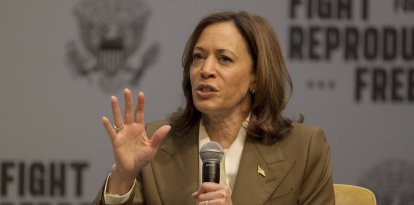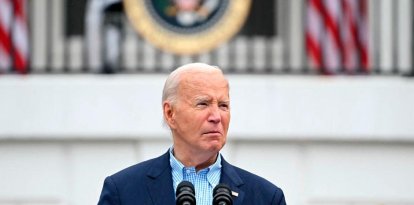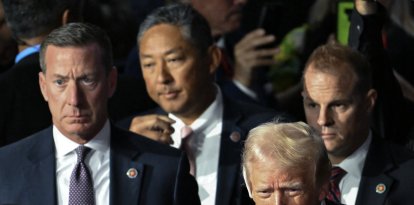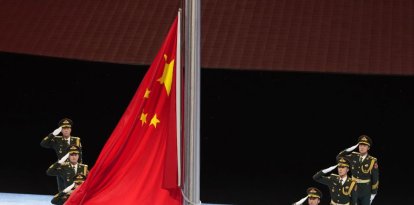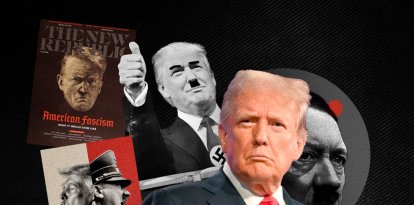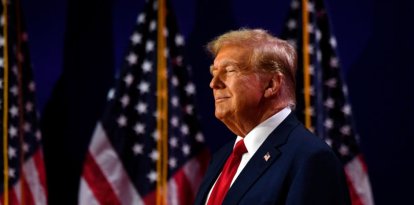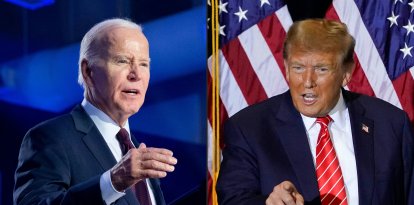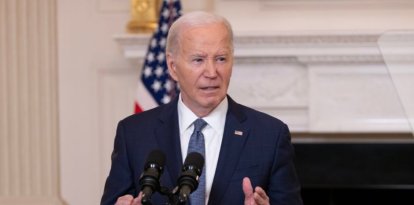A century since the death of Lenin, one of history's most notorious criminals
Lenin was not the white knight in a story spoiled by Stalin. Lenin, in fact, was the father of the impoverishing regime now associated with Stalin.
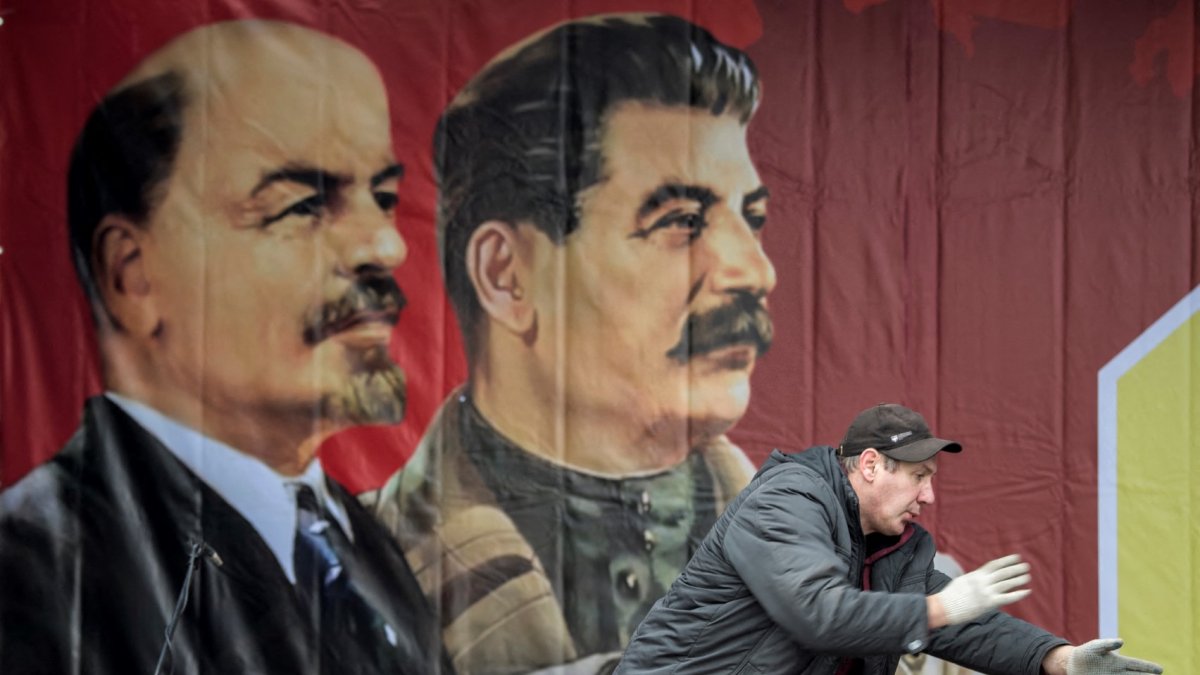
A worker gestures in front of a poster depicting Soviet leaders Vladimir Lenin and Joseph Stalin on a stage erected for events marking the 100th anniversary of The Bolshevik Revolution in downtown Moscow on November 7, 2017. (Photo by Mladen ANTONOV / AFP)
"It was Stalin!" they say like tattling children. And yes, it was Stalin behind the Gulag and the Moscow Trials and mass deportations and extreme terror and imperialism, hunger, poets reduced to silence, intellectuals humiliated and offended. But it turns out that it was Lenin too, and it was Lenin first. Lenin was the father, the Precursor.
Vladimir Ilyich Ulyanov was born in Simbirsk, now known as Ulyanovsk (one will find no Hitler am Inn in Austria), on April 22, 1870 to a wealthy family that ended up unsettled. In 1886, the father, a member of the civil servant nobility, died, and in 1887, the son Alexander, who wanted to kill Tsar Alexander for the sake of the People's Will (this was the name of his terrorist organization), was killed. In that same year, Volodya (Vladimir's nickname), a brilliant student at the University of Kazan, was expelled from the university for taking part in minor protests and for being his brother's brother. He was deported to Kokushino; read Marx, joined the People's Will, and fueled hatred and resentment. By 1888, he was back home.
He graduated with honors in law and practiced as a lawyer for a short time. It was not not his thing. His thing was politics, the Revolution.
In 1900, he went into exile and remained there until 1905. In those five years, he came to adopt the pseudonym "Lenin" (apparently inspired by the Siberian Lena River) and wrote his famous novel "What Is to Be Done?" where this heretic-burning fanatic laid the foundations for the heretic form of Marxism known as Marxism-Leninism. He attended the momentous Second Congress of the Russian Social Democratic Party, held in London in 1903, where his ideas on how to make the revolution generated the division, which later turned bloody, between the Mensheviks and the Bolsheviks, the latter a (very slim) majority, which was actually the meaning of the term "Bolshevik" in Russian.
The 1905 Russian Revolution caught this sinister know-it-all so off guard that he did not have the chance to latch on. He was also caught off guard by the revolution of 1917 and the fall of the Tsar. According to British historian Paul Johnson (be sure to read his "Modern Times"):
He was so quick to move in times of turbulence because he had no hesitation, no mercy, no humanity. In 1891, he was a nobody in the city of Samara. He refused to participate in a campaign to help the hungry there – who must have been part of the legion, considering that it was one of the worst famines in Russian history. (between 400,000 and 500,000 deaths) – because hunger had "numerous positive consequences," as he told a friend and was recorded in the shocking "Black Book of Communism":
God, had not just died, despite what Nietzsche had said. Lenin, the son of the devout Ilyá Nikolayevich Ulyanov, wanted to finish Him off and exterminate His servants (2,961 priests, 1,962 monks and 3,447 nuns murdered in 1922 alone).
Hunger would come again, this time with Lenin in power. However, this time it was much worse, simply unspeakable, and caused by his criminal policies. The famine of 1921-22 affected about 27 million people, killing between 3 and 5 million. The following is an excerpt from a letter he addressed to the Politburo on March 19, 1922 and cited in "The Black Book of Communism":
***
"In February 1917 the path to freedom opened before Russia. Russia chose Lenin," wrote Vasili Grossman in the memorable "Everything Flows." The phrase is catchy, but it is not true. Russia did not choose Lenin. Lenin did not come to power through a popular uprising but through a coup d'état, which murdered Liberty in the cradle ("Currently there is no country in the world as free as Russia," Lenin himself said in April of the decisive year 1917, as Christian Jelen recalls in his essential "L'aveuglement" ("The Self-Delusion"):
Lenin, a putschist (Johnson: "The real tragedy of the Leninist Revolution ... is that it revived a savage national method of government which was actually dying out quite fast"), knew that his rule could only be imposed through terror, which is why he immediately (December 1917) created the abominable All-Russian Extraordinary Commission, known as the Cheka or VCheka, to combat counter-revolutionaries and and sabotage. Johnson again:
There are those who estimate the number of state enemies murdered by the Cheka at 200,000. The commission later became known as the State Political Directorate (GPU) in 1922. Lenin did not protect the Cheka, it was that he protected it from the criticism of the intelligentsia so that terror was shown to be a "necessity," as he wrote in 1922 to Dimitri Kursky, who was serving as the commissioner of justice. "We must openly ... espouse a politically just principle that is the essence and motivation for terror, showing its necessity and its limits. The courts must not end the terror or suppress it in any way. ... They must give it a solid basis, and clearly legalize all its principles without any form of deception or deceit," also from "The Black Book of Communism."
The tsarist regime shot 3,932 people in the 92 years between 1825 and 1917. Leninism had already surpassed that figure in March 1918, just four months after taking power.
***
Lenin and Terror and Lenin and War. World War I made him who he was, the first totalitarian dictator in the century of mass death. He was against Russia's participation WW1, but not out of pacifism, rather out of tactics. He wanted war not between nations, but within nations. That ensured that Russia – which had between 1.7 and 3 million soldiers and between 1.5 and 3 million civilians killed – continued to bleed. The civil war (1918-20) unleashed by the Bolsheviks resulted in 2 million soldiers (from the White and Red armies) and 2 million civilians dead, and perhaps another two million exiled.
***
Fortunately, Lenin died an ugly death: three heart attacks in two years, his body paralyzed, mute, perhaps syphilitic. He ended up bitter, angry from not being able to continue his reign; like Hitler, accusing his people of not having lived up to the task. His reign of terror came to an end in Gorky on Jan. 21, 1924. Contrary to his wishes, he was embalmed and left him exposed forever and ever in the mausoleum in Red Square that bears his name.
“Lenin died. But Leninism did not die,” wrote the great Vasily Grossman:













